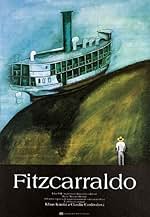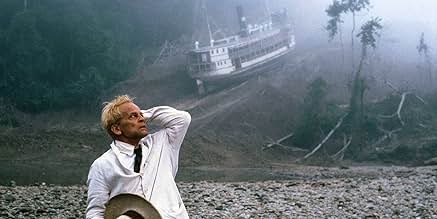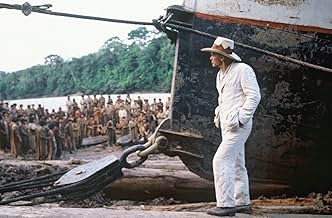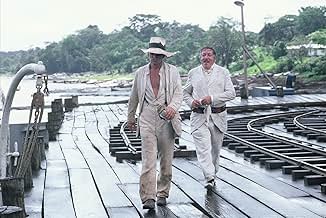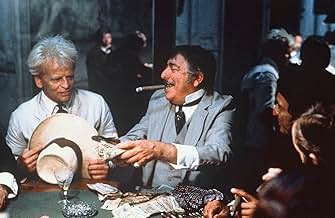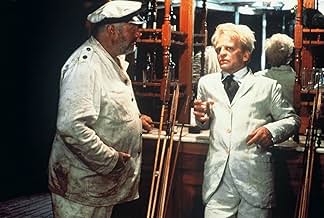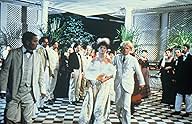Fitzcarraldo
- 1982
- Tous publics
- 2h 38min
Brian Sweeney Fitzgerald, dit Fitzcarraldo, a un rêve : construire un opéra au beau milieu de l'Amazonie. Pour financer son projet, il répare un bateau à vapeur afin de récolter le caoutchou... Tout lireBrian Sweeney Fitzgerald, dit Fitzcarraldo, a un rêve : construire un opéra au beau milieu de l'Amazonie. Pour financer son projet, il répare un bateau à vapeur afin de récolter le caoutchouc d'une zone reculée de la forêt.Brian Sweeney Fitzgerald, dit Fitzcarraldo, a un rêve : construire un opéra au beau milieu de l'Amazonie. Pour financer son projet, il répare un bateau à vapeur afin de récolter le caoutchouc d'une zone reculée de la forêt.
- Réalisation
- Scénario
- Casting principal
- Nomination aux 1 BAFTA Award
- 4 victoires et 4 nominations au total
- Cholo
- (as Miguel Angel Fuentes)
- Huerequeque (The Cook)
- (as Huerequeque Enrique Bohórquez)
- Station master
- (as Grande Othelo)
- Rubber Baron
- (as Rui Polanah)
- Old Missionary
- (as Salvador Godinez)
- Notary
- (as Bill Rose)
- Opera Singer
- (non crédité)
- Opera Singer
- (non crédité)
- Wilbur (scene cut)
- (non crédité)
Avis à la une
This seems especially true of "Fitzcarraldo," which, sets a hundred years ago, begins with an Irish colonist who had a passion for opera rowing 1,200 miles down a South American river, accompanied by the madam of a brothel, in order to hear the great Caruso perform
Inspired by this experience, Fitzcarraldo embarks on a grandiose plan to open up the Amazonian jungle to river transport, providing access to new rubber plantations and thereby making enough money to build an opera house
Herzog's favorite actor, Klaus Kinski, is as appropriately manic as Fitzcarraldo, eyes glittering madly as he pursues his vision In the central sequence he organizes a tribe of Indians to help him pull a steamboat across a mountain in order to by-pass dangerous rapids
"Fitcarraldo" seems by turns admiring of its hero's megalomania and mocking of his hubris, with no illusions about the cynical exploitation of the region's riches by the rubber barons whom Fitzcarraldo tries to defeat by cleverness Ultimately though, it is the sheer spectacle which we remember
Fitzcarraldo was a notoriously difficult film to make. Documentarian Les Blank even made his own film detailing some of the difficulties and apparent ironies, The Burden of Dreams (1982). Director Werner Herzog hauled his cast and crew to Amazonia for the shoot, where they ended up trapped in the rain forest for months. At one point the filmmakers' camp was set fire by Indians who objected to the production, there was an air crash in which some of the crew died, and a couple outrageous "stunts" in the film--including the main plot device of the climax--actually were outrageous, dangerous tasks rather than safe effects/model shots, as we'd expect them to be. Just the idea of pulling off the main stunt caused the Brazilian engineer initially associated with the project to abandon involvement. A number of cast members also backed out, including Mick Jagger and Jason Robards, who were both signed on at different points to play Kinski's role. Knowledge of these kinds of issues makes Fitzcarraldo even more fun to watch, and makes the fact that it was completed at all, not to mention that it is such an elegant masterpiece, more remarkable.
The tone of Fitzcarraldo overall closely matches Kinski's depiction of titular character. It is quirky and surreal, but very subtly yet satisfyingly so, with both an almost garish bizarreness (Kinski is quite odd looking in a way) balanced with a sublime beauty. Herzog imbues the film with a lot of gorgeous cinematography, enhanced by his unique sense of pacing. For example, he'll set the mood of a dawn/dusk scene with a lingering shot of a colorful sky, which then functions as symbolic of a night's events without directly showing them. Herzog matches this same technique in his action--he has an ability to say as much with what he doesn't show his actors doing (or saying) as with more conspicuous content.
Herzog also shows himself to be a master of selecting music to enhance mood and tell a story, as he balances an atmospheric Brian Eno-ish score from Popol Vuh, native jungle music, and vintage turn or the century recordings of Caruso singing Bellini, Verdi, Puccini and such. Of course opera is an important plot device that enters the film at various critical points. Even if you don't like opera, however, Herzog and Kinski make it (and the motivation for it) attractive in context, and you may just find this film beginning to turn around your feelings for that music.
It's interesting to note that even with Herzog's unusual pacing, the flow of the film always seems "natural". Fitzcarraldo also has an unusual plot structure, as it almost stream-of-consciously moves from opera in a formal European-seeming setting to a historical dramatic depiction of eccentrics in a native-filled Peruvian town, and then to an exciting adventure tale that is the heart of the film before it finally reaches an irony-filled, beautifully surreal dénouement. The constant throughout all of this is Fitzcarraldo, of course, who can't help being eccentric but charming, both to the film's audience and to other characters.
Fitzcarraldo is often interpreted as being somewhat critical of western encroachment on other cultures, such as Amazonia. Under this view, Herzog is usually seen as ironically "guilty" of the same actions that he's indicting. However, the film does not read as criticism to me. It's much more in line with what is usually considered to be a romantic tendency in Herzog. Fitzcarraldo is not at all a villain in the film, and neither are the European rubber barons. Instead, Fitzcarraldo is lovable and admirable if a bit crazy. The introduction of western culture doesn't end up being a negative. The natives in the film still retain their unique identities, and efforts are made to interact with them in their manner, not to adapt them to Eurocentrism. Cultural change may be inevitable with interaction, but the message of Fitzcarraldo is more that the interaction can produce unique, worthwhile cultures that are amalgamations of their precursors.
Another interesting subtext is that of Fitzcarraldo as Orpheus. Just as Orpheus enchanted wild beasts, trees and rocks on Mount Olympus with his lyre, causing them to "move from their places", Fitzcarraldo uses opera to enchant the natural world in which he is ensconced, eventually "moving mountains".
The most famous image in the film is the hauling of a large steam-boat up the side of a mountain (a feat which was achieved by the film-makers without the aid of special effects). Visually, the film is spectacular and everything is beautifully photographed. Kinski is superb as the crazed adventurer.
On the minus side, however, some viewers might be put off by the slow pace of the film.
This film stands as one of Herzog's best, and most accessible works, and is a must-see for anyone.
Filmmaking is a personal and social process for him, not a finished product. It's an extreme version of method acting. Like Fitzcarraldo's lifting of the boat, grand gestures go far for Herzog, if only to show the world that you're great and visionary enough to try. Most of his characters are done in by their obsessive drive (Fitzcarraldo's boat crashing into the rapids, Aguirre madly pacing about on his raft), but leave behind something beautiful. Like a boat being dragged up a mountain in Peru with ropes and pulleys or a gun depot going up like the 4th of July.
You can't give Herzog too much credit--he's been more careful not to be done in by his hubris than any of his characters were. In fact, he's capitalized on it, much the same way Cappola did after Apocalypse Now or Hopper did after Easy Rider. No doubt, the tales of his misadventures contribute as much to his films' popularity as the stories and images themselves, and he's been quick to market his persona with books, talks, and films about himself, the mad director.
But still, Herzog is a great romantic that was born of a time and place (Munich, 1942) with few romantics, which is its own great feat. See Fitzcarraldo for a little bit of that.
Le saviez-vous
- AnecdotesKlaus Kinski was a major source of tension on set, because he fought violently with the crew and raged over trivial matters. The natives were very upset about his behavior. Werner Herzog has claimed that one of the chieftains offered, in all seriousness, to murder Kinski. However, Walter Saxer, the production manager of this film, later confirmed that Herzog's story was not true.
- GaffesDuring one of boat drifting scene, crew members are visible at the top of the boat, including a man in jeans who tries to avoid the camera.
- Citations
Brian Sweeney Fitzgerald - 'Fitzcarraldo': How can anyone learn patriotism from a school book?
Young Missionary: The Government requires it.
Old Missionary: The natives get used to it. Like vaccination.
Young Missionary: The children already feel like little Peruvians. The other day I asked them, "Are you Indians?" "No," they said, "not we, the ones up the river, they are Indians." And then I asked. "What are Indians?" "They said to me "Indians are people who can't read and who don't know how to wash their clothes."
Brian Sweeney Fitzgerald - 'Fitzcarraldo': And what about the older people?
Old Missionary: Well, we can't seem to cure them of the idea that our everyday life is only an illusion, behind which lies the reality of dreams.
Brian Sweeney Fitzgerald - 'Fitzcarraldo': Actually, I'm very interested in these ideas. I specialise in opera myself.
- ConnexionsEdited into Spisok korabley (2008)
- Bandes originalesOpera in Manaos
from "Ernani" by Giuseppe Verdi
Production: Werner Schroeter
Ernani: Veriano Luchetti (voice)
Costante Moret (actor)
Silva: Dimiter Petkov (voice and actor)
Elvira: Mietta Sighele (voice)
Singer at orchestra: Lourdes Magalhaes
Sarah Bernhardt: Jean-Claude Dreyfus (as Jean-Claude Dreyfuss)
Stage design: Gianni Ratto
Orchestra of the Filarmonica Veneta
Conducted by Giorgio Croci
Meilleurs choix
- How long is Fitzcarraldo?Alimenté par Alexa
Détails
- Date de sortie
- Pays d’origine
- Langues
- Aussi connu sous le nom de
- Фіцкарральдо
- Lieux de tournage
- Plaza de Armas, Iquitos, Pérou(Fitzcarraldo's house)
- Sociétés de production
- Voir plus de crédits d'entreprise sur IMDbPro
Box-office
- Budget
- 14 000 000 DEM (estimé)
- Montant brut mondial
- 4 475 $US
Contribuer à cette page


